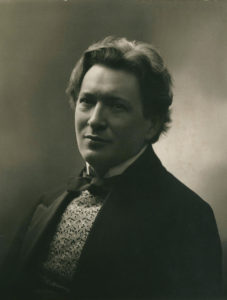
Yesterday’s Music History Monday post marked the death on July 27, 1924 of the musical polymath Ferruccio Busoni (1866-1924). Today’s Dr. Bob Prescribes post picks up where yesterday’s Music History Monday left off, with an examination of what is, perhaps, Busoni’s single most representative work: his massive, 30-plus minute-long Fantasia Contrappuntistica for piano.
Hugo Leichtentritt – Ferruccio Busoni’s first biographer – wrote on the occasion of Busoni’s 50th birthday in 1916 that:
“He is a campaigner, not a quiet, complacent inheritor. He is a pioneer [and yet] he is anchored in the past by many roots.”
A good choice of words, that: “anchored” in the past, not “stuck” in it. The core belief of Busoni’s artistic worldview was be yourself but be yourself responsibly. Like Beethoven, he believed in contextuality – use those rules, those elements of the past that speak directly to your creative heart when you can – and then ignore them when expressive context demands. Busoni believed that it was the essential responsibility of every composer to decide what was right, and to never dogmatically follow any tradition that went against his or her own grain.
(For example, Busoni was repelled by the Wagner fetish of his time, which to his mind compelled composers to follow a compositional drumbeat that was not of their own making.)
Be yourself but be yourself responsibly. In his “Sketch of a New Aesthetic of Music” written in 1907, Busoni asserted that:
“Creative power may be the more readily recognized the more it shakes itself loose from tradition. But an intentional avoidance of the rules cannot masquerade as creative power, and still less, engender it.”
For Busoni, the essential rule of musical law was architecture: creating clear, carefully wrought musical structures. For Busoni, the ultimate music in the great Western canon was that of Johann Sebastian Bach.
It had always been so. Busoni’s earliest piano lessons, given to him by his father, revolved around the music of Johann Sebastian Bach, music that shaped forever his musical psyche. Writing much later in life, he was amazed by the good luck of it all:
“My father was a simple virtuoso on the clarinet, a man of incomplete musical education, an Italian. How did such a man hit upon the very one thing that was right? I can only compare it to a mysterious revelation. He educated me in this way to be a German musician and showed me the path which I never deserted.”
A fitting example, then of Busoni’s musical and structural priorities – his incredible compositional technique, his tendency towards what was called “Gigantomania” in his major works, his singular approach to the keyboard, and his love for the music of Johann Sebastian Bach – is his Fantasia Contrappuntistica. …
Continue reading on Patreon for the full background of the work and Dr. Bob’s prescribed recording!
